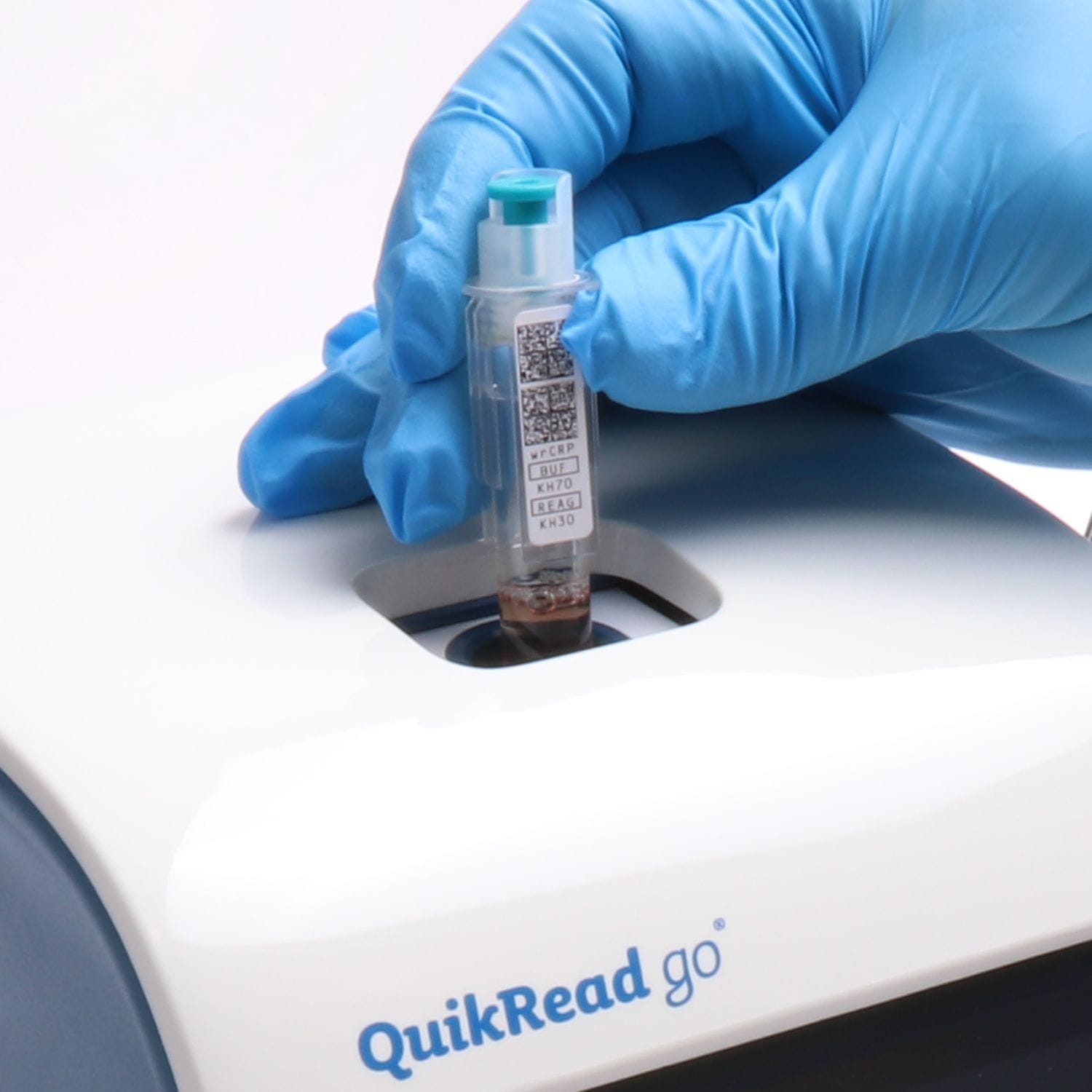
CRP point of care testing in the assessment of lower respiratory tract infections in South Powys
Introduction
In October 2018, Red Kite Health Solutions introduced a pilot of point of care (POC) testing for CRP in to the four practices in South Powys. The pilot followed NICE guidelines with regards to the diagnosis and management of pneumonia in adults to help support clinical decisions with regards to patients presenting with symptoms of lower respiratory tract infections in primary care.
If a diagnosis is unclear after clinical assessment, and if there is doubt about the need to prescribe antibiotics, the ability to obtain a diagnostic test result within two minutes would be available to support clinicians.
‘NICE’s quality standard on infection prevention and control states that in order to help prevent the development of antibiotic resistance in bacteria, it is important to prescribe antibiotics according to the principles of antimicrobial stewardship. These include prescribing antibiotics only when needed (and not for self-limiting mild infections such as colds and most coughs, sinusitis, earache and sore throats) and reviewing the continued need for them’
(NICE, 2018)
The current pathway for antibiotic prescribing in patients presenting with symptoms would be made by a GP or Nurse Practitioner based on clinical examination, history and risk factors without diagnostics. Prior to the introduction of the pilot, CRP results could only be obtained from a venous blood sample with the result returning within 48 hours, so was not typically used as an assessment test for acute infections. It is considered that POC tests can improve clinical decision-making in antibiotic prescribing which supports antimicrobial stewardship.
Aim
The aim of this pilot was to evaluate if POC testing would change current practices and support clinical decisions with regards to antibiotic prescribing in South Powys and to evaluate and improve current practice processes in relation to delayed prescribing arrangements.
Method
Eight QuikRead Go machines were purchased and supplied by Red Kite Health Solutions to the four practices in South Powys. Machines consisted of a POC testing unit, using a finger-prick blood sample vial with the CRP result being available to the clinician within 2 minutes.
Training and guidance were offered and provided to selected practice staff, and each practice was supplied with an ongoing supply of CRP testing strips. An EMIS template was devised and shared amongst the practices to capture the number of POC tests carried out and the outcome of these tests over the pilot period.
Immediate antibiotic treatment was to be offered if the CRP level was more than 100mg/litre and a delayed prescription should be considered at levels between 20and 100mg/litre. Immediate prescribing is not recommended for CRP levels less than 20mg/litre.
The Red Kite Pharmaceutical team were tasked with following up patients tasked to them who had been prescribed a delayed prescription. To record whether the patient took the medication or if symptoms resolved/improved without the requirement for medication. The data collected from these outcomes could then be collated and analysed. The team also presented the findings and advice to the clinical teams within the practices ongoing throughout the pilot.
The initial pilot ran from October 2018 to April 2019.
Results
From October 2018 to April 2019 789 CRP point of care tests were carried out.
Outcomes were recorded for 100% of these tests.
| Antibiotics Indicated | 117 |
| Antibiotics Not Indicated | 575 |
| Antibiotics Delayed | 92 |
| Patient Admitted to Hospital | 5 |
| Total | 789 |
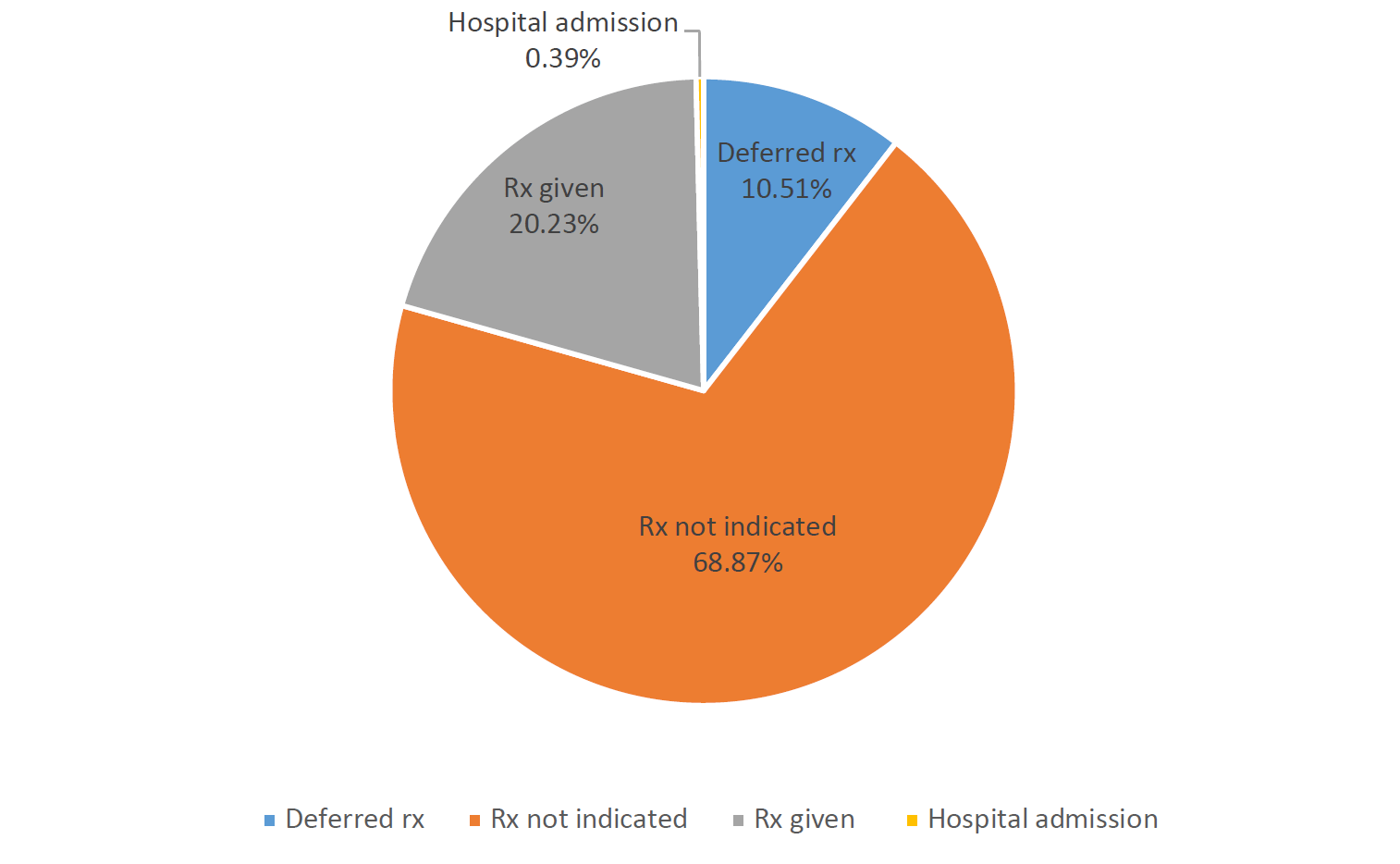
The Pharmacy team in 3 of the practices followed up 92 patients who had received a delayed prescription 1-2 weeks after their appointment to record if the patient:
a) Filled the prescription
b) Took the medication and completed or did not take/complete the course
C) Symptoms resolved/improved without medication
D) Patient unable to be contacted
| Prescription filled | 55 |
| Patient completed course | 32 |
| Patient started but did not complete course | 9 |
| Symptoms resolved without medication | 17 |
| Unable to contact patient | 32 |
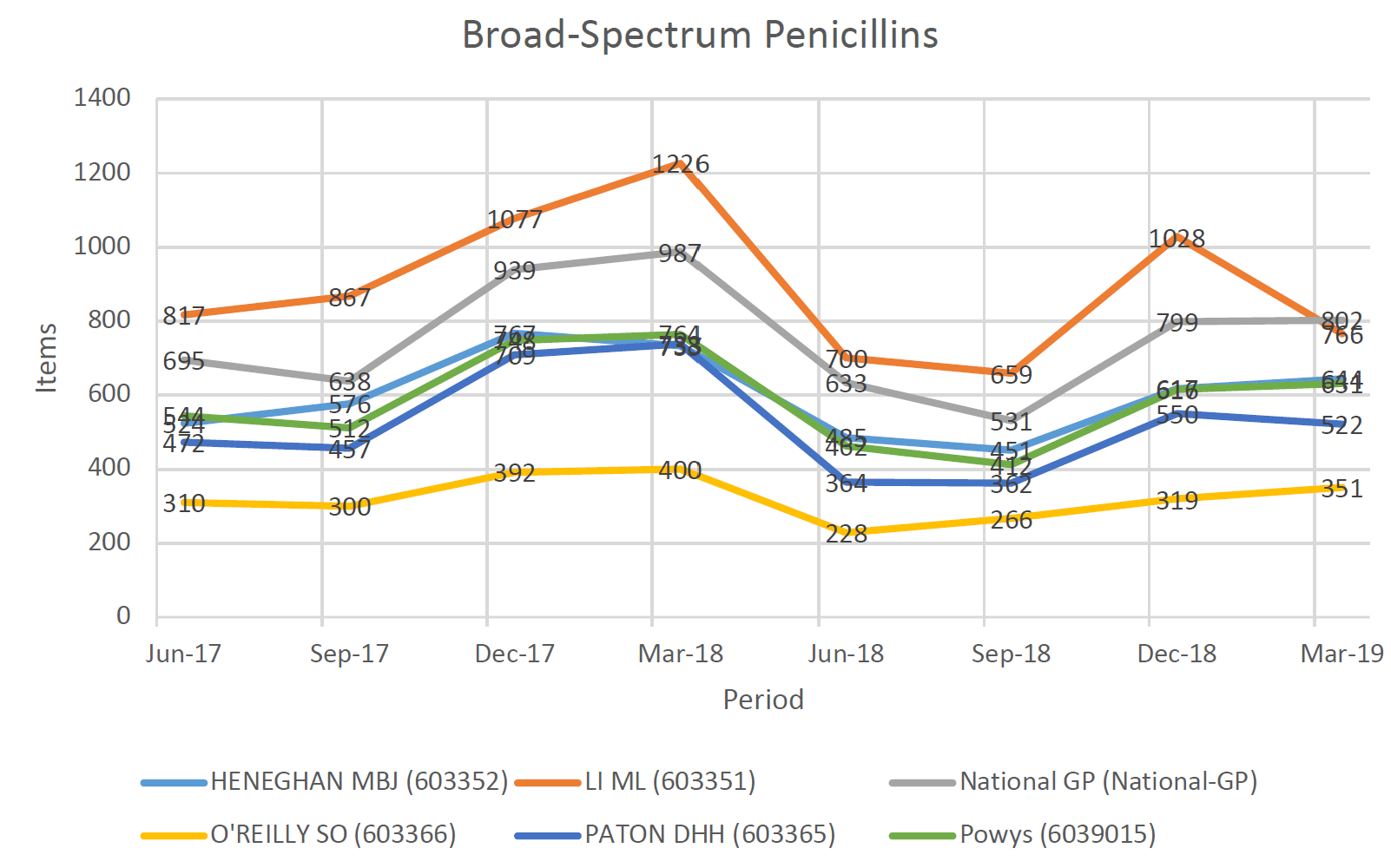
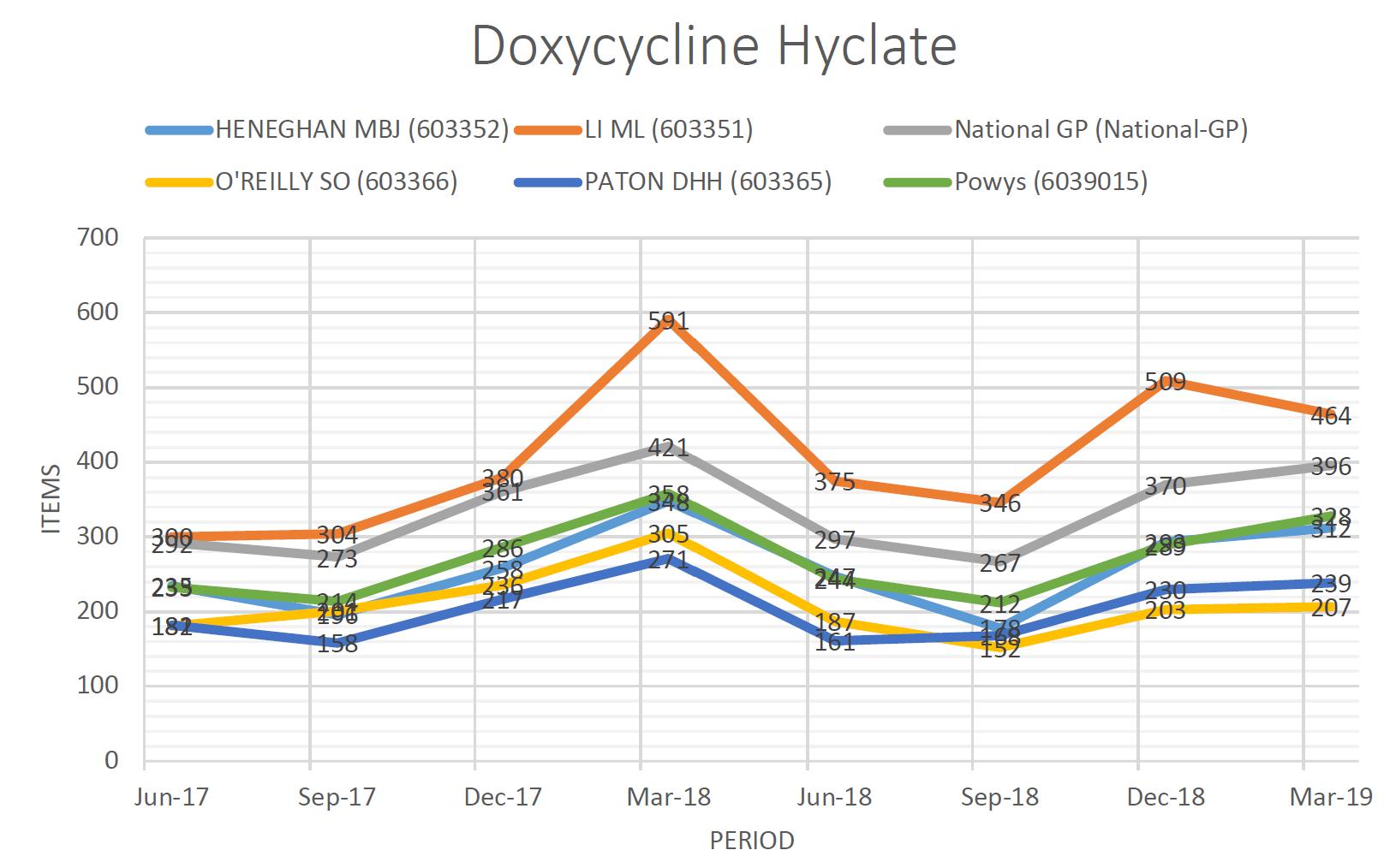
Summary
Of the 789 patients tested, 68.87% of patients did not receive a prescription for antibiotics. It can be assumed from practice feedback that a higher majority of these patients would have been prescribed an antibiotic or a delayed antibiotic without the clinical support of the testing equipment and based solely on clinical examination and history. A number of patient consultations had to be manually trawled due to incomplete use of the clinical template by clinicians. Follow-up was also affected by the communication to the Pharmacy team from clinical staff where a delayed prescription was supplied, or from difficulties in contacting patients during working hours.
National and Powys prescribing data was collected from Caspa for broad spectrum antibiotics and doxycycline. An overall reduction in antibiotic prescribing was seen during Oct 18-April 19 compared to Oct 17 – April 18.
Clinical system (EMIS web) prescribing results concluded a 17.5% decrease in first line prescribing for LRTI’S across the cluster from 17/18 to 18/19.
It can also be seen from the Caspa data that in two of the south Powys practices this reduction was greater than the National or Powys average reduction, which could be a result of clinical decision being influenced by the result of the CRP testing, however, these results are subject to several variables which this pilot cannot exclude.
10.5% of patients were given a delayed prescription as result of carrying out the CRP test, which was an increase of over 7.5% prior to the introduction of the POC testing, however, further work is required here to streamline the systems used for issuing delayed prescriptions which vary vastly in each practice.
As a result of the internal procedures, the outcomes varied between practices due to incomplete results. This was due to incomplete template completion, communication between teams and difficulties in contacting patients.
Results were improved in the practice that delayed collection of the delayed prescription and asked patients to contact the Pharmacy team after 48 hours if not improved. These patients were unable to fill the prescription and would only call if genuinely feeling unwell.
This area will be developed to ensure completion of templates and further development of protocols with recommendations to the above process.
‘I had the test at my appointment and the reading was very high. The GP sent me straight to the hospital where I was diagnosed with pneumonia. Cannot fault the service and treatment, all within a few hours. Happy to say I am now fully recovered’
Patient, Feb 2019
Conclusion and recommendations
Overall, the clinical teams have welcomed the use of the QuikRead go machines due to the speed of diagnostic testing and the supportive evidence obtained when a clinical diagnosis is not clear. It also provides reassurance to patients who may be declined antibiotics and has reduced the requirement for defensive prescribing.
All staff found the machines easy to use and have implemented them as an integral part of a clinical consultation in suspected LRTI’s. Post pilot, clinicians will make use of the machines in other clinical areas. A further evaluation will follow to investigate the improvements made in delayed prescribing protocol. Due to the success of the machines, in December 2018 Red Kite donated a QuikRead machine to the mid-Powys community Pharmacist to assist the successful minor illness program in Llanidloes Pharmacy .
‘The CRP machine is great. It allows me to provide evidence to the patient of my clinical decision and the confidence to have those discussions. Patients accept decisions not to prescribe or delay more readily. Getting the results in 2 minutes also means I don’t have to interrupt the GPs as often to discuss the patient’
ANP, Dec 19

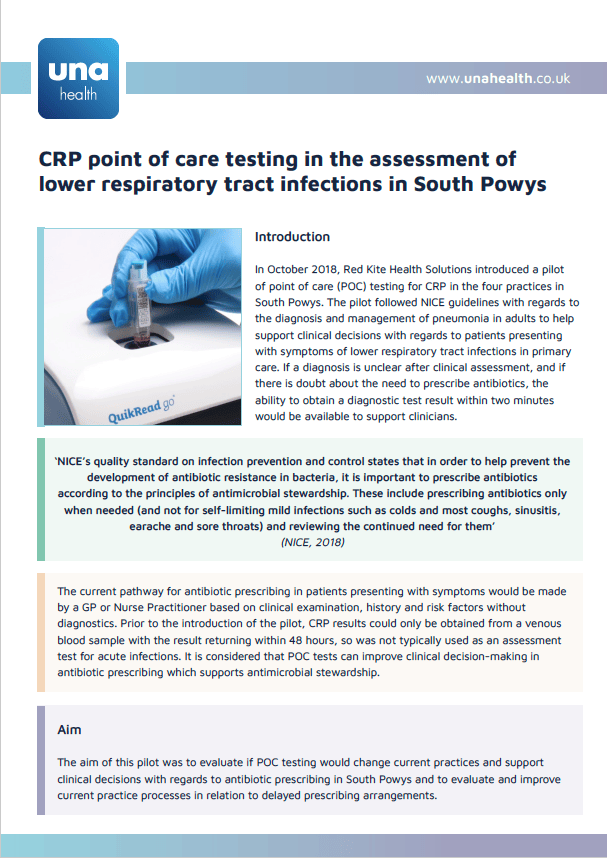
Case study available to download
CRP point of care testing in the assessment of lower respiratory tract infections in South Powys
